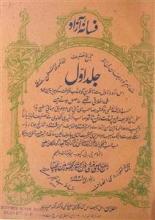Serialisation allowed for remarkable experimentation with the new genre of the novel in colonial South Asia. The open nature of serialisation in South Asia, in which novels were not planned in advance but rather could develop and change while in progress, meant that serialised versions of novels were often more experimental than their later book editions. In this article, I use the pioneering Urdu novel Fasāna-e Āzād (1878–83) as a case study to examine serialisation’s effects on the emerging novel genre in the late nineteenth-century South Asia. By comparing the serial version and later book editions, I show that Fasāna-e Āzād underwent a fundamental transformation from serial to book, changing from a set of satirical sketches critical of Westernisation, to a pro-colonial novel. The protagonist Azad’s shift from a picaresque anti-hero to a proto-nationalist hero reflected the changing nature of respectability, what in Urdu was called sharafat, in the late nineteenth-century South Asia. Finally, I suggest that Fasāna-e Āzād’s evolution from serial to book anticipated the turn in South Asian literature from satire towards nationalist and prescriptive discourse, reflecting the broad movement from ideological and narratological openness to closedness in the twentieth century.
